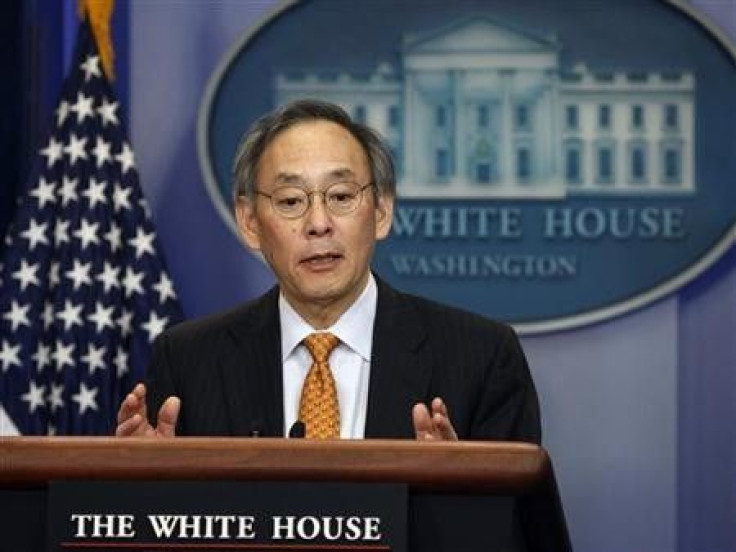Analysis: Energy Secretary Chu Faces Showdown on Solyndra

Energy Secretary Steven Chu has said it may take similar skills to navigate Washington politics as it does to make advances in physics research, a field in which he won a Nobel Prize in 1997.
You have to keep your wits about you, you have to dispassionately analyze what's the best path to go forward, Chu said this month at a Washington Post energy conference. Breakthroughs will happen, setbacks will happen. You use those breakthroughs to work around those setbacks to go forward.
Chu's ability to rise above political setbacks will be put to the test on Thursday, when he will face the toughest grilling to date in his Washington career.
Republicans on the House Energy and Commerce Committee want to know why he and his department gave a $535 million loan guarantee to Solyndra, a California solar panel company that went bankrupt in September and is being investigated by the FBI.
Republicans favor more drilling for oil and gas, and have been scathing critics of President Barack Obama's efforts to champion loan guarantees for clean energy companies as a way to jump-start the sagging economy. The issue is expected to follow Obama as he campaigns for re-election in 2012.
The challenge for Secretary Chu is to put this particular case in a larger context that is compelling to people, said David Victor, a political scientist at the University of California, San Diego, who has focused on energy policy.
Chu will need to convincingly articulate that government support is critical to commercialize clean energy, even though not all projects will succeed -- and in spite of Republican arguments that the government should stay out of energy projects, Victor said.
But Chu also will need to defend the details of how the Solyndra aid was managed, including whether the government should have pulled the plug earlier when the company had run out of cash, instead of agreeing to restructure the company's debt, Victor said.
That decision has led to some private investment being ranked ahead of taxpayers' debt in the bankruptcy proceedings.
The White House announced its own independent review of the Energy Department's $35.9 billion loan portfolio two days before a second recipient of a loan guarantee -- energy storage company Beacon Power Corp -- filed for bankruptcy in October.
SOLYNDRA LEGACY
Washington has never seen an energy secretary like Chu, a bicycle-riding, self-professed nerd whose public speeches sometimes veer into the arcane. During the Asian Pacific Economic Cooperation forum in Honolulu earlier this week, Chu talked to world leaders about energy-efficient appliances.
Chu last spoke publicly about Solyndra on November 3, when he defended the need for the United States to compete with renewable energy investments made by China and other countries.
I came to Washington because I deeply believe in the importance of our mission, Chu said when asked whether he would leave the administration after the 2012 election.
There's nothing that's happened that's ever made me think maybe that wasn't the right belief. I believe this even more strongly today, he said.
Chu and the Obama administration aimed to help spark renewable energy production as one way to make the United States less dependent on pollution-spewing fossil fuels.
The political fallout from Solyndra will make that mission more difficult.
Most major government supports for renewable energy are set to expire by the end of December. New financing alternatives like the Clean Energy Deployment Administration developed by the Senate Energy Committee, are now in doubt.
Anything that involves the government taking risks in energy, which is politically hard to do even on a good day in Washington, is five times harder today because of Solyndra, said the University of California's Victor.
'HOTTEST KITCHEN IN TOWN'
Some Obama supporters have questioned whether Chu is right for the job. In February, an adviser to the 2008 presidential campaign advocated that Chu be named as chief scientist and push for an overhaul of leadership positions at the Energy Department.
Secretary Chu is a wonderful and brilliant man, but he is not perfect for the other critical DOE mission: deploying existing technologies at scale and creating jobs, said Dan Carol, who serves on an federal advisory panel, in an e-mail that the White House released to Republican investigators.
Others have said the sprawling department lacked strong financial and political managers during a time when its budget ballooned with stimulus funds for clean energy projects.
The question is, do we have the right balance right now in the leadership of the department? said one analyst, who like others with concerns about the department, spoke on condition of anonymity.
But Elgie Holstein, an Energy Department official during the Clinton administration, said political scrutiny comes with the territory.
I know enough about the department to know it's one of the hottest kitchens in town, Holstein said.
The challenges faced by the Energy Department would have been difficult for any bureaucracy, said Andrew Holland, an analyst with the American Security Project, a think-tank.
It doesn't matter who is at the helm - you're going to have a problem getting that much money out the door in a way that is both effective and meeting all the rigors that we demand of our government, Holland said.
© Copyright Thomson Reuters 2024. All rights reserved.











